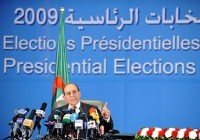Registration
Thank you!
You will receive an email confirming your registration.
IMGXYZ1397IMGZYX"Bouteflika, as he moves into his third term, is increasingly circumventing political institutions. Instead of using political parties or working policies with parliament, he has independently gained loyalty by the distribution of rent", concluded a CMEC roundtable featuring Amel Boubakeur, Associate Scholar, and Geoff Porter, Director Middle East and Africa at Eurasia Group, who described the April elections in Algeria as a "non-event", as seen by the international community.
Despite the predictable outcome, Boubekeur says we should still focus on what is happening with the elections because they are indicative of changing trends in Algeria. Changes include a shift away from the use of political parties and institutions to rentier-focused politics by the Bouteflika administration, the ongoing importance of Islamist candidates, and the importance of new forms of protests such as boycotts.
Bouteflika, as he moves into his third term, is increasingly circumventing political institutions. Instead of using political parties or working policies with parliament, he has independently gained loyalty by the distribution of rent. For example Bouteflika unilaterally sought to ease student and farmer grievances by making executive decisions to double scholarships and reduce agricultural debt.
The Islamist movement remains important as two of the candidates are from Islamist parties. This couldn’t have happened ten years. Bouteflika wants to strengthen the Reconciliation Process, which includes involving Islamist parties, partly as a way to try and legitimize the election process in the eyes of the international community.
Boubekeur’s final point was that abstention now matters. In the past Bouteflika’s administration was dismissive of those who boycotted elections. But now Bouteflika appears to worry that boycotts will have real affect on the election and has begun a get out the vote campaign, as well as allowed those who were banned in past elections to run this time.
The second part of the roundtable was on what economic reform means in Algeria. Near-term prospects for the Algerian economy are relatively positive according to Geoffrey Porter, but economic reform should probably overall be viewed as negative. Porter argued that it appears that Bouteflika has now recently returned to a nationalist stance, last embraced in Algeria during the 1970s, which has had a negative effect on foreign investment.
With 135$ Billion in hard currency reserves and another 160$ Billion in an oil stabilization fund, Algeria looks great from a fiscal perspective. However, from a macro-economic point of view, it looks far worse, with oil and gas at 79 percent of exports and 81 percent of total fiscal receipts. The non-hydrocarbon sector is declining, employment is flat, and unemployment is increasing in certain sectors. Additionally, Algerian oil production is flat and probably going into decline.
According to Porter, this stagnation has been coupled with new statist or nationalism style policies. Members of the administration initially attempted reform to attract more foreigners in early 2000, but in 2006, under pressure from Bouteflika, hydro-carbon reform laws were retracted and heavy taxes introduced. In one case, a United States company was taxed for all of their profits. This, and many other examples, were seen by international companies as a warning and investment has plunged.
